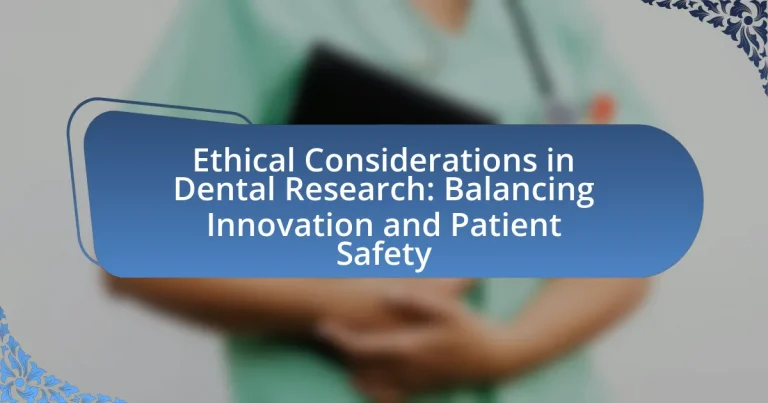The article focuses on ethical considerations in dental research, emphasizing the importance of informed consent, patient safety, and research integrity. It outlines key ethical principles such as respect for persons, beneficence, non-maleficence, and justice, which guide researchers in protecting patient rights and welfare. The discussion highlights the challenges researchers face in maintaining ethical standards, including the influence of financial incentives and the need for regulatory oversight. Additionally, it addresses best practices for ensuring ethical compliance, the role of institutional review boards, and strategies for balancing innovation with patient safety in dental research.

What are the Ethical Considerations in Dental Research?
Ethical considerations in dental research primarily involve informed consent, patient safety, and the integrity of research practices. Informed consent ensures that participants understand the nature, risks, and benefits of the research, which is crucial for ethical compliance. Patient safety is paramount, as researchers must prioritize the well-being of participants and minimize any potential harm during studies. Additionally, the integrity of research practices requires transparency, honesty, and adherence to ethical guidelines, such as those established by the Declaration of Helsinki, which emphasizes the importance of ethical standards in medical research. These considerations collectively aim to protect participants while advancing dental science.
Why is ethics important in dental research?
Ethics is crucial in dental research because it ensures the protection of patient rights and welfare. Ethical guidelines govern the conduct of research, ensuring that studies are designed and implemented in a manner that prioritizes informed consent, confidentiality, and the minimization of harm. For instance, the Declaration of Helsinki emphasizes the necessity of ethical standards in medical research, which includes dental studies, to safeguard participants’ interests and promote trust in the research process. This ethical framework not only enhances the credibility of the research but also fosters advancements in dental practices that are both innovative and safe for patients.
What ethical principles guide dental research?
The ethical principles that guide dental research include respect for persons, beneficence, non-maleficence, and justice. Respect for persons emphasizes informed consent, ensuring that participants understand the research and voluntarily agree to participate. Beneficence requires researchers to maximize benefits while minimizing harm to participants, which is crucial in dental studies where procedures may involve risks. Non-maleficence mandates that researchers avoid causing harm, aligning with the Hippocratic principle of “do no harm.” Justice involves fair distribution of the research benefits and burdens, ensuring that no group is unfairly targeted or excluded from participation. These principles are foundational in maintaining ethical standards in dental research, as outlined in the Belmont Report, which serves as a key guideline for ethical research practices in the United States.
How do ethical considerations impact patient trust?
Ethical considerations significantly impact patient trust by establishing a foundation of transparency, respect, and accountability in healthcare interactions. When healthcare providers adhere to ethical principles, such as informed consent and confidentiality, patients are more likely to feel secure in sharing personal information and engaging in treatment plans. Research indicates that trust is closely linked to ethical behavior; for instance, a study published in the Journal of Medical Ethics found that patients who perceive their healthcare providers as ethical are more likely to comply with medical advice and maintain long-term relationships with their providers. This correlation underscores the importance of ethical considerations in fostering a trusting environment, ultimately enhancing patient outcomes and satisfaction.
What challenges do researchers face in maintaining ethical standards?
Researchers face significant challenges in maintaining ethical standards, primarily due to the tension between innovation and patient safety. This challenge arises from the need to conduct cutting-edge research while ensuring that patient welfare is not compromised. For instance, the requirement for informed consent can be complicated by the complexity of new treatments, making it difficult for patients to fully understand the risks involved. Additionally, researchers often encounter pressure to produce favorable results, which can lead to ethical dilemmas regarding data integrity and transparency. A study published in the Journal of Medical Ethics highlights that 30% of researchers reported feeling pressured to alter results to meet funding expectations, illustrating the pervasive nature of these ethical challenges.
How do financial incentives affect ethical decision-making?
Financial incentives significantly influence ethical decision-making by creating potential conflicts between profit motives and ethical standards. Research indicates that when individuals or organizations prioritize financial gain, they may compromise ethical principles, leading to decisions that prioritize revenue over patient safety or research integrity. For example, a study published in the Journal of Business Ethics found that financial incentives can lead to increased instances of unethical behavior, such as data manipulation or neglecting patient welfare, particularly in high-stakes environments like healthcare. This demonstrates that financial motivations can distort ethical judgment, ultimately impacting the quality of care and trust in the dental research field.
What role does informed consent play in dental research ethics?
Informed consent is a fundamental component of dental research ethics, ensuring that participants are fully aware of the nature, risks, and benefits of the research before agreeing to participate. This ethical requirement protects patient autonomy and promotes transparency, allowing individuals to make informed decisions regarding their involvement in research studies. According to the Belmont Report, which outlines ethical principles for research involving human subjects, informed consent is essential for respecting individuals’ rights and welfare. Furthermore, adherence to informed consent protocols helps to foster trust between researchers and participants, ultimately contributing to the integrity of the research process.

How can Innovation be Balanced with Patient Safety in Dental Research?
Innovation in dental research can be balanced with patient safety by implementing rigorous ethical guidelines and regulatory frameworks that prioritize patient welfare while fostering advancements. Regulatory bodies, such as the FDA, require thorough preclinical and clinical testing to ensure new dental technologies and treatments are safe before they reach patients. Additionally, ethical review boards assess research proposals to ensure that potential risks are minimized and informed consent is obtained from participants. Studies, such as those published in the Journal of Dental Research, highlight the importance of continuous monitoring and post-market surveillance to identify any adverse effects of new innovations, ensuring that patient safety remains paramount throughout the research and implementation process.
What are the potential risks of innovative dental research?
Innovative dental research poses several potential risks, including patient safety concerns, ethical dilemmas, and regulatory challenges. Patient safety risks may arise from untested procedures or materials that could lead to adverse effects, such as infections or allergic reactions. Ethical dilemmas often involve informed consent, where patients may not fully understand the implications of participating in experimental treatments. Regulatory challenges can stem from navigating complex approval processes, which may delay the implementation of beneficial innovations. These risks highlight the need for rigorous oversight and ethical standards in dental research to ensure patient safety and trust in new advancements.
How can researchers mitigate risks to patient safety?
Researchers can mitigate risks to patient safety by implementing rigorous ethical guidelines and conducting thorough risk assessments prior to initiating studies. These measures ensure that potential hazards are identified and addressed, thereby safeguarding participants. For instance, adherence to the Declaration of Helsinki emphasizes the importance of informed consent and the necessity of minimizing harm, which is crucial in dental research. Additionally, employing robust monitoring systems during trials allows for real-time identification of adverse effects, enabling prompt intervention. Studies have shown that institutions with strong ethical oversight and risk management frameworks report fewer incidents of patient harm, reinforcing the effectiveness of these strategies in enhancing patient safety.
What protocols ensure patient safety during innovative procedures?
Protocols that ensure patient safety during innovative procedures include informed consent, risk assessment, and adherence to established clinical guidelines. Informed consent requires that patients are fully educated about the procedure, including potential risks and benefits, allowing them to make an informed decision. Risk assessment involves evaluating the specific risks associated with the innovative procedure, which helps in identifying necessary precautions. Adherence to established clinical guidelines ensures that the procedure is performed according to best practices, minimizing the likelihood of adverse outcomes. These protocols are supported by regulatory frameworks such as the FDA’s guidelines for medical devices and procedures, which mandate rigorous testing and evaluation to ensure patient safety.
How does regulatory oversight influence the balance between innovation and safety?
Regulatory oversight plays a crucial role in balancing innovation and safety by establishing guidelines that ensure new dental technologies and practices are both effective and safe for patients. These regulations require rigorous testing and validation processes, which can slow down the introduction of innovative solutions but ultimately protect patient welfare. For instance, the U.S. Food and Drug Administration (FDA) mandates premarket approval for dental devices, ensuring they meet safety standards before reaching the market. This oversight helps prevent harmful products from being used in clinical settings, thereby fostering a safer environment for patients while still encouraging advancements in dental research and technology.
What are the key regulations governing dental research?
The key regulations governing dental research include the Common Rule, the Health Insurance Portability and Accountability Act (HIPAA), and the Food and Drug Administration (FDA) regulations. The Common Rule, established by the U.S. Department of Health and Human Services, outlines the ethical principles for the protection of human subjects in research, requiring informed consent and Institutional Review Board (IRB) approval. HIPAA safeguards patient privacy and data security in research involving health information. FDA regulations oversee clinical trials involving dental products and treatments, ensuring safety and efficacy before market approval. These regulations collectively ensure that dental research is conducted ethically and prioritizes patient safety.
How do regulatory bodies assess the safety of new dental technologies?
Regulatory bodies assess the safety of new dental technologies through a systematic evaluation process that includes pre-market submissions, clinical trials, and post-market surveillance. These organizations, such as the U.S. Food and Drug Administration (FDA) and the European Medicines Agency (EMA), require manufacturers to provide evidence of safety and efficacy, often necessitating rigorous clinical testing to demonstrate that the technology performs as intended without posing undue risk to patients. For instance, the FDA mandates that dental devices undergo a premarket notification or premarket approval process, which involves detailed documentation of testing results, manufacturing processes, and labeling information. This thorough assessment ensures that any new dental technology meets established safety standards before it can be marketed to the public.

What Best Practices Should Researchers Follow to Uphold Ethical Standards?
Researchers should adhere to informed consent, confidentiality, and integrity to uphold ethical standards. Informed consent ensures that participants are fully aware of the research purpose, procedures, risks, and benefits before agreeing to participate. Confidentiality protects participants’ personal information, fostering trust and encouraging participation. Integrity involves conducting research honestly, reporting findings accurately, and avoiding fabrication or plagiarism. These practices are supported by guidelines from organizations such as the American Psychological Association and the World Medical Association, which emphasize the importance of ethical conduct in research to protect participants and maintain the credibility of the scientific community.
How can researchers ensure informed consent is properly obtained?
Researchers can ensure informed consent is properly obtained by providing clear, comprehensive information about the study, including its purpose, procedures, risks, and benefits. This transparency allows participants to make an educated decision regarding their involvement. Additionally, researchers should use plain language and confirm understanding through discussions or quizzes, ensuring that participants grasp the information provided. The process should also include the opportunity for participants to ask questions and receive answers before consenting. According to the Belmont Report, which outlines ethical principles for research involving human subjects, informed consent is a fundamental requirement that protects participants’ autonomy and rights.
What information should be included in the consent process?
The consent process should include information about the purpose of the research, the procedures involved, potential risks and benefits, confidentiality measures, and the right to withdraw at any time without penalty. This ensures that participants are fully informed and can make educated decisions regarding their involvement. According to the Belmont Report, which outlines ethical principles and guidelines for research involving human subjects, informed consent is a fundamental requirement that protects participants’ autonomy and welfare.
How can researchers address potential language barriers in consent?
Researchers can address potential language barriers in consent by utilizing professional translation services and providing consent forms in multiple languages. This approach ensures that participants fully understand the information presented to them, which is crucial for informed consent. Studies have shown that clear communication significantly enhances participant comprehension and trust, thereby improving ethical standards in research. For instance, the World Health Organization emphasizes the importance of culturally and linguistically appropriate materials in health research to ensure that all participants can engage meaningfully in the consent process.
What strategies can be implemented to foster ethical research environments?
To foster ethical research environments, institutions should implement comprehensive training programs on research ethics for all personnel involved in studies. These programs should cover topics such as informed consent, data integrity, and the importance of transparency in research practices. Evidence shows that institutions with robust ethics training report higher compliance with ethical standards, as seen in a study published in the Journal of Medical Ethics, which found that 75% of researchers who underwent ethics training adhered to ethical guidelines compared to only 50% of those who did not. Additionally, establishing clear policies for reporting unethical behavior and creating an open dialogue about ethical dilemmas can further enhance the ethical climate in research settings.
How can training programs enhance ethical awareness among dental researchers?
Training programs can enhance ethical awareness among dental researchers by providing structured education on ethical principles, regulations, and real-world case studies. These programs often include modules on informed consent, patient confidentiality, and the ethical implications of research methodologies, which are crucial for maintaining integrity in dental research. For instance, a study published in the Journal of Dental Research highlighted that researchers who participated in ethics training demonstrated a 30% increase in their understanding of ethical guidelines compared to those who did not undergo such training. This evidence underscores the effectiveness of training programs in fostering a culture of ethical responsibility within the dental research community.
What role do institutional review boards play in promoting ethical research?
Institutional review boards (IRBs) play a crucial role in promoting ethical research by ensuring that studies involving human subjects adhere to ethical standards and regulations. IRBs review research proposals to assess risks, benefits, and the informed consent process, thereby safeguarding participants’ rights and welfare. For instance, the U.S. Department of Health and Human Services mandates that all federally funded research involving human subjects must be reviewed by an IRB, which helps maintain ethical integrity in research practices. This oversight is essential in fields like dental research, where patient safety and ethical considerations must be balanced with innovation.
What are the common pitfalls in dental research ethics to avoid?
Common pitfalls in dental research ethics to avoid include inadequate informed consent, lack of transparency in funding sources, and failure to ensure patient confidentiality. Informed consent must be comprehensive, allowing participants to understand the risks and benefits of the study; studies have shown that many participants do not fully grasp these elements, leading to ethical violations. Transparency in funding is crucial, as undisclosed financial interests can bias research outcomes; a review by the American Dental Association highlighted that conflicts of interest can compromise the integrity of research. Lastly, maintaining patient confidentiality is essential, as breaches can lead to loss of trust and legal repercussions; the Health Insurance Portability and Accountability Act mandates strict adherence to privacy standards in healthcare research.
How can conflicts of interest be managed effectively?
Conflicts of interest can be managed effectively through transparency, disclosure, and establishing clear guidelines. Transparency involves openly communicating any potential conflicts to relevant stakeholders, ensuring that all parties are aware of the interests involved. Disclosure requires individuals to formally declare any financial or personal interests that may influence their research or decision-making processes. Establishing clear guidelines includes creating policies that outline acceptable behaviors and procedures for addressing conflicts, which can help maintain integrity in dental research. Research indicates that institutions with robust conflict of interest policies experience fewer ethical breaches, thereby enhancing trust and safety in patient care.
What are the consequences of unethical practices in dental research?
Unethical practices in dental research can lead to significant consequences, including compromised patient safety, loss of public trust, and legal repercussions. Compromised patient safety occurs when research is conducted without proper ethical oversight, potentially resulting in harmful treatments or inaccurate data that can adversely affect patient health. Loss of public trust arises when unethical practices are exposed, leading to skepticism about the integrity of dental research and the validity of findings, which can hinder future research efforts and patient participation. Legal repercussions may include lawsuits, fines, and sanctions against researchers or institutions, as seen in cases where fraudulent data has been published, such as the retraction of studies that misrepresented clinical outcomes. These consequences underscore the critical importance of ethical standards in maintaining the integrity of dental research and ensuring patient safety.
What practical tips can researchers follow to balance innovation and patient safety?
Researchers can balance innovation and patient safety by implementing rigorous risk assessment protocols throughout the research process. This involves conducting thorough preclinical studies to evaluate potential risks before human trials, ensuring that any innovative techniques or treatments are safe and effective. Additionally, researchers should engage in continuous monitoring of patient outcomes during clinical trials, allowing for real-time adjustments to protocols if safety concerns arise. Establishing a multidisciplinary oversight committee can further enhance safety by providing diverse perspectives on ethical considerations and potential risks associated with new innovations. These practices are supported by regulatory guidelines, such as those from the FDA, which emphasize the importance of patient safety in the advancement of medical research.


